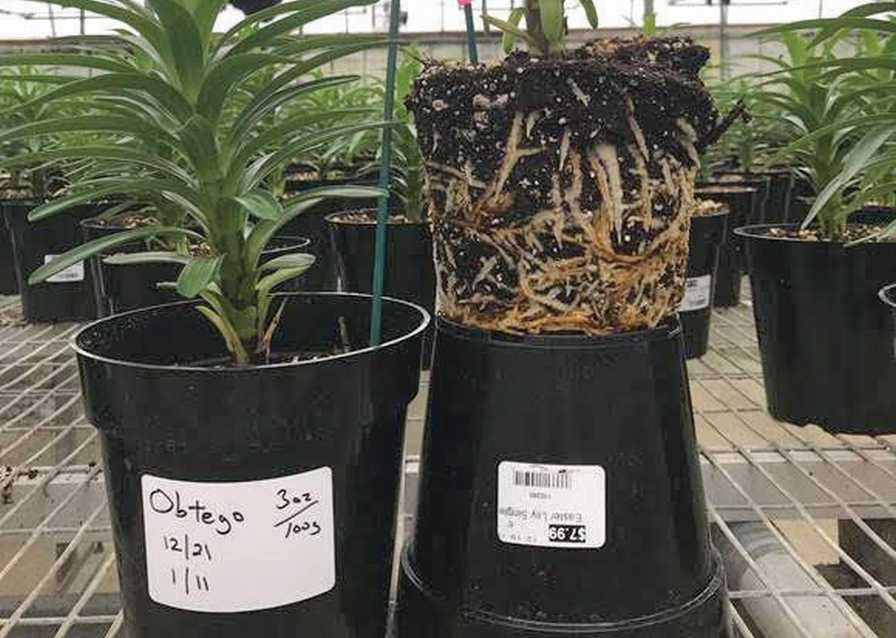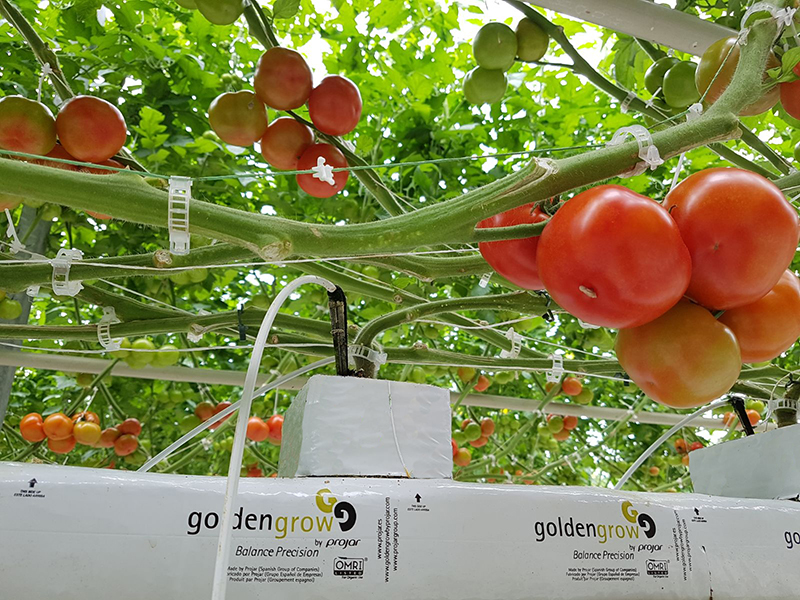New and Improved Options in Greenhouse Crop Protection

This photo shows the enhanced root development in Easter lilies treated with Obtego Fungicide and Plant Symbiont.
Photo courtesy of GrowSpan Greenhouses
Greenhouse crop protection manufacturers are constantly bringing out new products as well as updating and expanding existing labels. Being aware of the latest developments in crop protection technologies helps you understand the full range of options available for protecting your greenhouse crops. Here’s what three crop protection companies who responded had to say about crop protection today.
New Products Offer Protection for Plants and Workers
SePRO introduced Obtego Fungicide and Plant Symbiont in December 2018, a new product used to enhance root growth and protect plants from damaging soil-borne pathogens. Two species of fungi combine to form a powerful fungicide that is effective in a wide range of soil and environmental conditions. Obtego works well against Pythium spp., Phytophthora spp., Rhizoctonia spp., and more. As Obtego colonizes the root system, the Obtego fungi promote competition and parasitism of plant-damaging pathogens in the soil, which stimulates the development of a vigorous root system. This symbiosis results in a healthy, high-quality plant.
OHP continues to provide new technology-based pesticide solutions with Fortress and Kalmor. Fortress is a pre-emergent, granular herbicide for weed control in nursery containers and field-grown ornamentals. It produces virtually no dust and low odor, improving worker safety and ease of application. Kalmor is a broad-spectrum fungicide/bactericide for prevention and control of diseases in a variety of plants.
Compatibility Is Still a Priority With Biocontrols
Biological control continues to increase in the industry, says Nancy Rechcigl of Syngenta.
“[These materials] work best when applied in tandem with compatible insecticides. Ensuring compatibility is crucial to save you time and resources.”
Many operations continue to add vegetable plants and herbs to diversify their offerings, and biological control agents are often used in vegetable production as part of an integrated pest management (IPM) strategy. However, not all chemical products are compatible within these types of programs.
It is imperative to continually check for compatibility research and use available resources to help ensure a successful IPM strategy when incorporating both insecticides and biological control methods.
Endeavor and Mainspring GNL insecticides from Syngenta are two products proven to show compatibility with a broad range of biological control agents. Endeavor controls aphids and whiteflies with a new class of chemistry that eliminates pests through insect-feeding inhibition. It is now approved for use on vegetable plants grown for consumers and includes drench applications for ornamentals only. MainSpring GNL is a neonicotinoid-alternative insecticide that guards greenhouse and nursery crops from thrips, whiteflies, aphids, caterpillars, leafminers, leaf-feeding beetles, soft scales, and lace bugs. It offers reliable, extended protection as part of a preventive pest management strategy.

Check your biocontrols for compatibility with synthetic chemistries to avoid any problems.
Photo courtesy of Syngenta
Balanced Use of Synthetics and Bios Offer Higher Levels of Protection
From a synthetic plant protection perspective, there has not been a lot of unique introductions in the last few years, says Mark Brotherton of SePRO. Many growers are implementing biological control agents (BCAs) and improving cultural practices that reduce both insect and disease pressure and promote healthier plants. However, synthetic chemistries still play an important role, especially those that are compatible with biocontrol solutions. Both can complement each other. Brotherton says it’s interesting to note the importance manufacturers are placing on bio-compatibility when introducing new products to the market.
Ongoing research often leads to changes in product formulation resulting in improved performance. Recently, SePRO had EPA-approved expansions to two products, Hachi-Hachi SC Insecticide and Rycar Insecticide. Hachi-Hachi SC was approved for use on outdoor ornamental plants. Rycar has been approved for use on tomatoes, cucumbers, peppers, and lettuce grown in a greenhouse.









